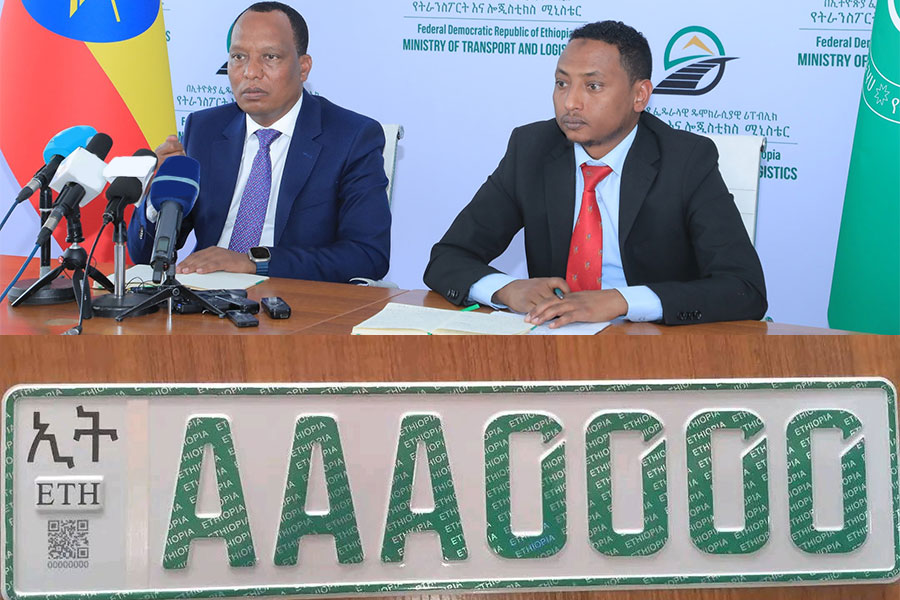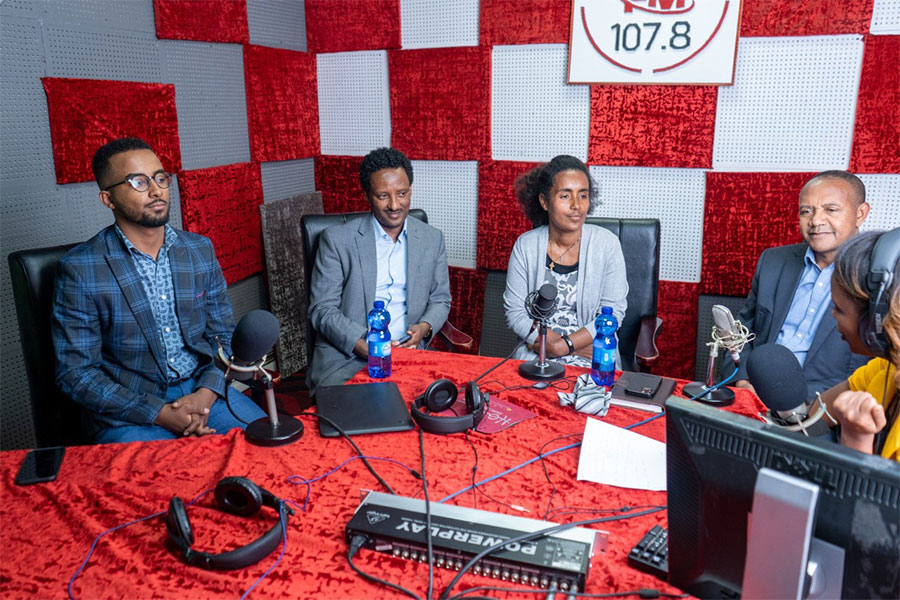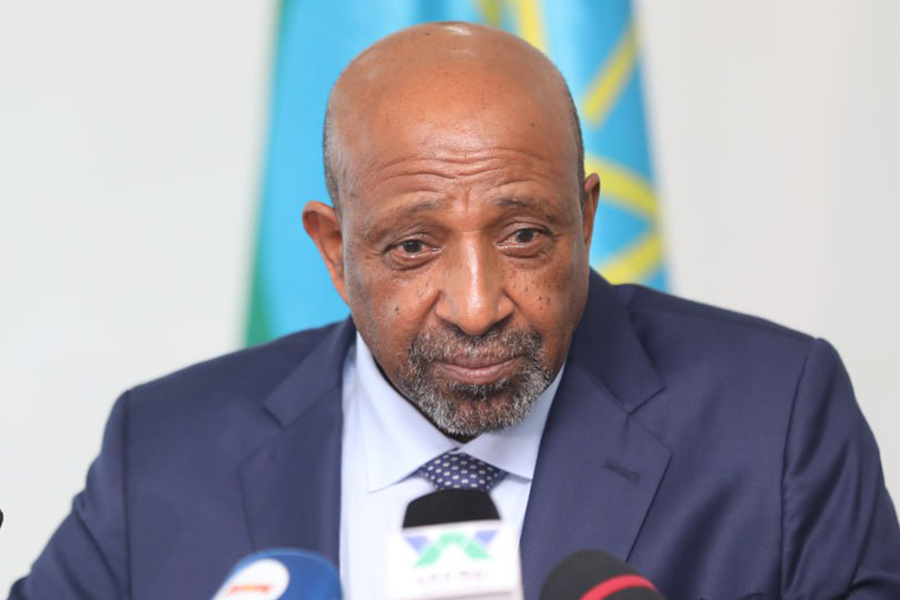
Feb 15 , 2020.
Senior government officials of African countries recently descended on Addis Abeba to attend the annual African Union (AU) Summit of Heads of State and Government. As was usual with these meetings, there was more fluff than substance. But there was a curious way in how the theme of the session - “Silencing the Guns” - was tackled.
It was an ambitious promise to end all conflicts and achieve peace in a continent blighted by problems that largely stem from the same governments that make up the organisation. In their discussions, the Union's Commission, as well as the heads of state, gave substantially disproportionate focus to the relationship between instability and underdevelopment.
Even Moussa Faki Mahamat, chairperson of the African Union Commission, did not bring up the effect of lack of socioeconomic progress in fueling conflicts during his closing statement on February 9, 2020. To his credit, he pointed to inter-African trade and job creation for the youth as areas for improvement. But growing economic inequality in Africa received too little attention for a summit that concerned itself with silencing the guns. The growing inequality in the continent is superbly highlighted by the African Economic Outlook 2020, a flagship publication by the African Development Bank (AfDB), whose President, Akinwumi Adesina (PhD), was one of the delegates last week.
The role the economy plays in affecting politics was likewise all but forgotten when Prime Minister Abiy Ahmed (PhD) appeared before parliament on February 3, 2020. Legislators deserved credit in highlighting the increasing instances of the breakdown of law and order across the country in no uncertain terms in what was an uncharacteristic show of disappointment at the performance of the executive.
But not much was raised and discussed on the state of the economy.
Why was it lost on many MPs that the cost of living is escalating and major legislation set to shape the economy for decades was pushed their way by the Council of Ministers?
Coupled with an unabating foreign currency shortage, creeping devaluation of the Birr and rising demand, inflation reached 19.5pc in December. This set a worrying precedent in that it easily outpaces the average inflation rate of the last fiscal year, which stood at 13.7pc.
As inflation ramped up, liquidity levels were also going down at commercial banks as their loan-to-deposit ratios passed the legal threshold set forth by the National Bank of Ethiopia (NBE). But the central bank merely sat back and watched as banks’ liquidity levels reached a level where it was necessary to bail them out with 14.5 billion Br of loans.
MPs were no more worried about the murkiness of the liberalisation push. If they were, they did not show it. Ethiopia's government has struck a deal with the International Monetary Fund (IMF) and the World Bank, the details of which have not been made public, in exchange for the financing of almost six billion dollars. The agreement with the Fund will be the largest that has ever been afforded to Ethiopia since joining the institution as a founding member in 1945.
The administration of Prime Minister Abiy has also resumed its accession process into the World Trade Organisation (WTO) after eight years mainly characterised as lacking the political resolve to join. Ethiopia’s negotiators have offered to cut tariffs on 90pc of traded goods, a move that is sure to complicate the foreign currency crisis and long-held policies toward encouraging the expansion of the domestic manufacturing sector. They hope to conclude the deal within a year.
When an MP brought up Abiy’s “homegrown” economic policy, it was not to address its possible drawbacks. It was to make the political point that Prosperity Party (PP) is not following the economic policy platform the EPRDF was elected on in 2015. It was less about the reform itself but rather the legitimacy question surrounding Prosperity Party as heir to EPRDF’s incumbency.
Legislators' seeming indifference to the economic malaise is symptomatic of the national discourse. There are few debates or forums that do not touch upon the breakdown of the rule of law, the fault lines on which the federal structure is established or government transparency.
Yet economic policy debates on unemployment, inequality, urbanisation, the cost of living or liberalisation are few. And if any, they are held far apart. There are few political parties in the country whose positions on politically hot-button issues are not explicit. It is in sharp contrast to how rare it is to find a party, outside Prosperity Party, and perhaps TPLF, with a stated economic position.
Politics has overwhelmingly dominated the space in which the national discourse is carried out. Considering the deteriorating state of the rule of law, the privatisation and regularisation of violence is an unavoidable topic of concern that deserves its fair share of attention. But the dearth of debate around the economy is unjustified when economic policies continue to be upended, the cost of living reduces households to poverty and banks are hard-pressed for liquidity.
If there is ever any debate about such issues, it takes in the few and far apart corners of social media platforms. The only time they are brought into the mainstream is when patriotic sentiments are needed to be expressed. Here again, the purpose of the discussion is not substantive debate on the impacts of opening up parts of the economy but whether or not non-nationals should be allowed to own parts of state enterprises such as Ethiopian Airlines.
As policies are devised, and legislations passed without substantive debate outside government offices, Abiy’s administration is getting a free reign in restructuring the economy.
Such political indifference toward the economy is not unprecedented. It is usually a topic left for the government to strain through and structure as it sees fit unless it has direct implications on hot-button topics. An example of this is the attention afforded to Addis Abeba's recent initiatives to build houses in the inner city compared to middle- and low-housing projects located on the outskirts.
Such a culture stems from the view that Ethiopia’s woes are symptoms of its political dysfunction. And it is. But this ignores that this dysfunction is caused at least partially as much by economic disenfranchisement as it is with lack of representation, exclusion, injustice or the perceived loss of lingo-cultural identities. Growing unemployment, income inequality and lack of basic services and goods create a bleak political atmosphere that contributes to conflict and unrest, as does the absence of political rights.
By fueling social discontent, economic underperformance creates political dysfunction that, in turn, reduces investment, creating a vicious circle. This relationship between the economy and politics is not lost on the political players. They merely lack the responsibility and courage to bring up discussions that cannot be easily packaged to mobilise the masses.
It falls on the shoulders of the centrist voices to call attention to the state of the economy and the hazy direction it is being led toward. They ought to demand the political elites, especially those in the opposition, take positions on how the economy is being administered and draw up policies they believe can address unemployment, the rise in the cost of living and income inequality.
The more space that is provided to political debates in the national discourse at the expense of economic discussions, the likelier that political dysfunction will remain misunderstood and unaddressed.
PUBLISHED ON
Feb 15,2020 [ VOL
20 , NO
1033]

Editorial | Nov 27,2021

Editorial | Jun 07,2020

Fortune News | Dec 02,2023

Sunday with Eden | Jul 25,2020

Fortune News | Sep 23,2023

Advertorials | Mar 06,2023

My Opinion | Aug 08,2020

Commentaries | Aug 17,2019

Radar | Dec 01,2024

Radar | Sep 14,2024

Photo Gallery | 171454 Views | May 06,2019

Photo Gallery | 161695 Views | Apr 26,2019

Photo Gallery | 151418 Views | Oct 06,2021

My Opinion | 136291 Views | Aug 14,2021

Dec 22 , 2024 . By TIZITA SHEWAFERAW
Charged with transforming colossal state-owned enterprises into modern and competitiv...

Aug 18 , 2024 . By AKSAH ITALO
Although predictable Yonas Zerihun's job in the ride-hailing service is not immune to...

Jul 28 , 2024 . By TIZITA SHEWAFERAW
Unhabitual, perhaps too many, Samuel Gebreyohannes, 38, used to occasionally enjoy a couple of beers at breakfast. However, he recently swit...

Jul 13 , 2024 . By AKSAH ITALO
Investors who rely on tractors, trucks, and field vehicles for commuting, transporting commodities, and f...

Oct 5 , 2025 . By NAHOM AYELE
In Meqelle, a name long associated with industrial grit and regional pride is undergo...

Oct 5 , 2025 . By BEZAWIT HULUAGER
The federal government is set to roll out a new "motor vehicle circulation tax" in th...

Oct 5 , 2025 . By NAHOM AYELE
The Bank of Abyssinia is wrestling with the loss of a prime plot of land once leased...

Oct 5 , 2025 . By BEZAWIT HULUAGER
The Customs Commission has introduced new tariffs on a wide range of imported goods i...